University Assignment: 8300 Week 1 - Mandatory Vaccination Dispute
VerifiedAdded on 2020/04/15
|6
|1006
|41
Essay
AI Summary
This essay delves into the contentious issue of mandatory influenza vaccinations for healthcare workers. It begins by highlighting the importance of vaccination in preventing the spread of communicable diseases and ensuring patient safety. The essay explores the ethical dilemmas faced by policymakers, including conflicts arising from uncertainty, inadequate knowledge, and differing values among healthcare staff. It discusses the potential benefits of mandatory vaccination, such as increased patient safety and public trust, while also acknowledging concerns about staff autonomy and potential decisional conflicts. The conclusion emphasizes the need for educational approaches and mandatory immunization policies to protect both healthcare workers and patients, despite a lack of solid evidence proving harm from non-immunized staff. The essay references several studies and publications to support its arguments.
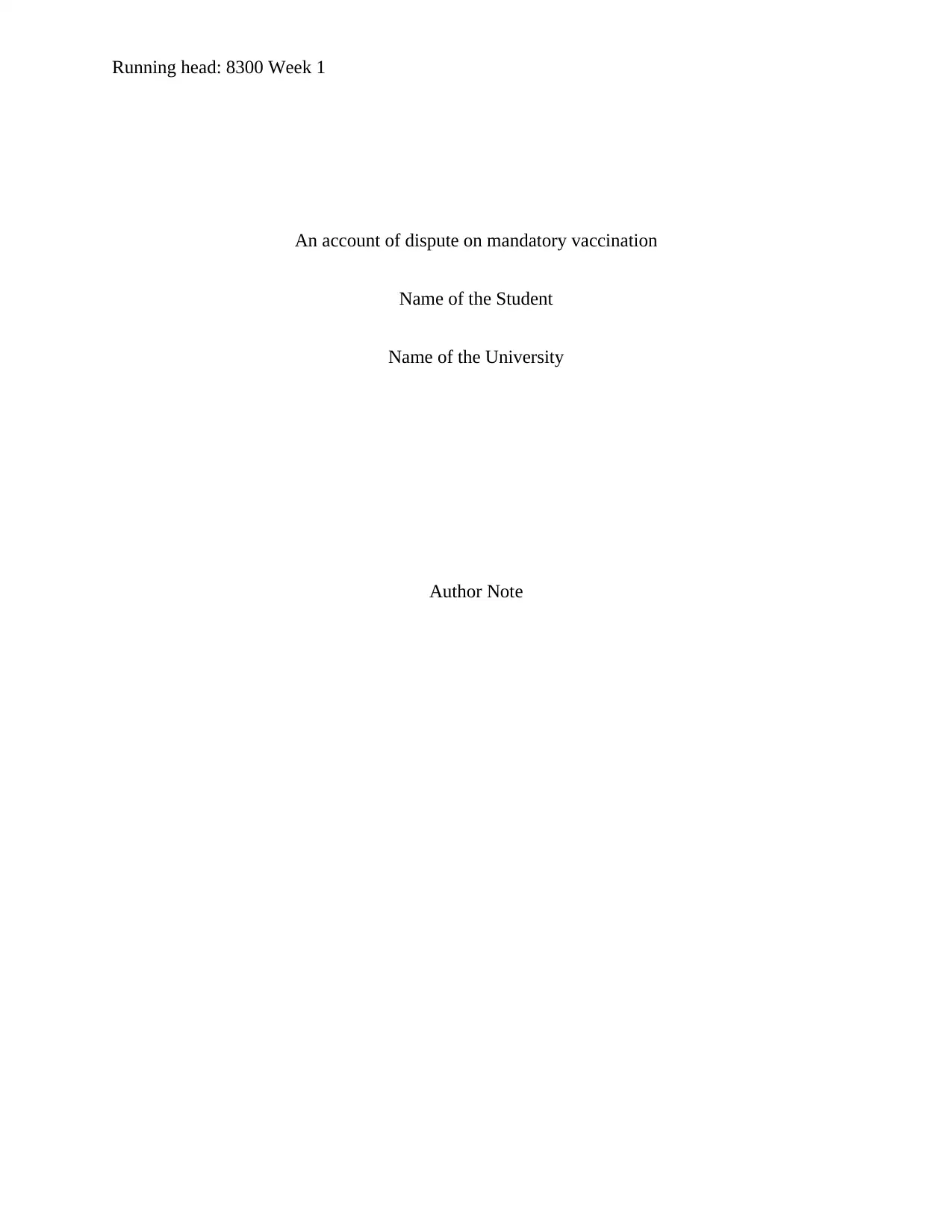
Running head: 8300 Week 1
An account of dispute on mandatory vaccination
Name of the Student
Name of the University
Author Note
An account of dispute on mandatory vaccination
Name of the Student
Name of the University
Author Note
Paraphrase This Document
Need a fresh take? Get an instant paraphrase of this document with our AI Paraphraser
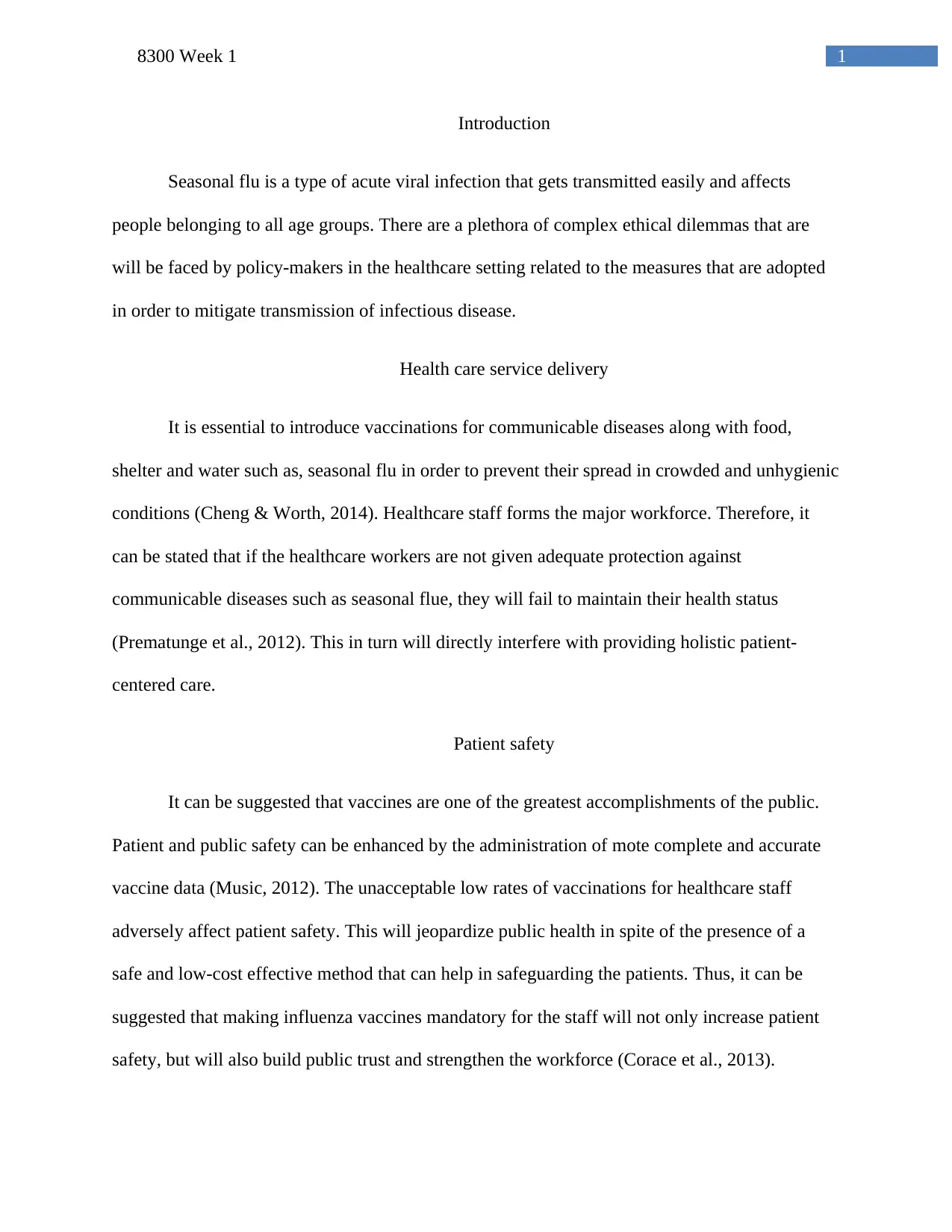
18300 Week 1
Introduction
Seasonal flu is a type of acute viral infection that gets transmitted easily and affects
people belonging to all age groups. There are a plethora of complex ethical dilemmas that are
will be faced by policy-makers in the healthcare setting related to the measures that are adopted
in order to mitigate transmission of infectious disease.
Health care service delivery
It is essential to introduce vaccinations for communicable diseases along with food,
shelter and water such as, seasonal flu in order to prevent their spread in crowded and unhygienic
conditions (Cheng & Worth, 2014). Healthcare staff forms the major workforce. Therefore, it
can be stated that if the healthcare workers are not given adequate protection against
communicable diseases such as seasonal flue, they will fail to maintain their health status
(Prematunge et al., 2012). This in turn will directly interfere with providing holistic patient-
centered care.
Patient safety
It can be suggested that vaccines are one of the greatest accomplishments of the public.
Patient and public safety can be enhanced by the administration of mote complete and accurate
vaccine data (Music, 2012). The unacceptable low rates of vaccinations for healthcare staff
adversely affect patient safety. This will jeopardize public health in spite of the presence of a
safe and low-cost effective method that can help in safeguarding the patients. Thus, it can be
suggested that making influenza vaccines mandatory for the staff will not only increase patient
safety, but will also build public trust and strengthen the workforce (Corace et al., 2013).
Introduction
Seasonal flu is a type of acute viral infection that gets transmitted easily and affects
people belonging to all age groups. There are a plethora of complex ethical dilemmas that are
will be faced by policy-makers in the healthcare setting related to the measures that are adopted
in order to mitigate transmission of infectious disease.
Health care service delivery
It is essential to introduce vaccinations for communicable diseases along with food,
shelter and water such as, seasonal flu in order to prevent their spread in crowded and unhygienic
conditions (Cheng & Worth, 2014). Healthcare staff forms the major workforce. Therefore, it
can be stated that if the healthcare workers are not given adequate protection against
communicable diseases such as seasonal flue, they will fail to maintain their health status
(Prematunge et al., 2012). This in turn will directly interfere with providing holistic patient-
centered care.
Patient safety
It can be suggested that vaccines are one of the greatest accomplishments of the public.
Patient and public safety can be enhanced by the administration of mote complete and accurate
vaccine data (Music, 2012). The unacceptable low rates of vaccinations for healthcare staff
adversely affect patient safety. This will jeopardize public health in spite of the presence of a
safe and low-cost effective method that can help in safeguarding the patients. Thus, it can be
suggested that making influenza vaccines mandatory for the staff will not only increase patient
safety, but will also build public trust and strengthen the workforce (Corace et al., 2013).
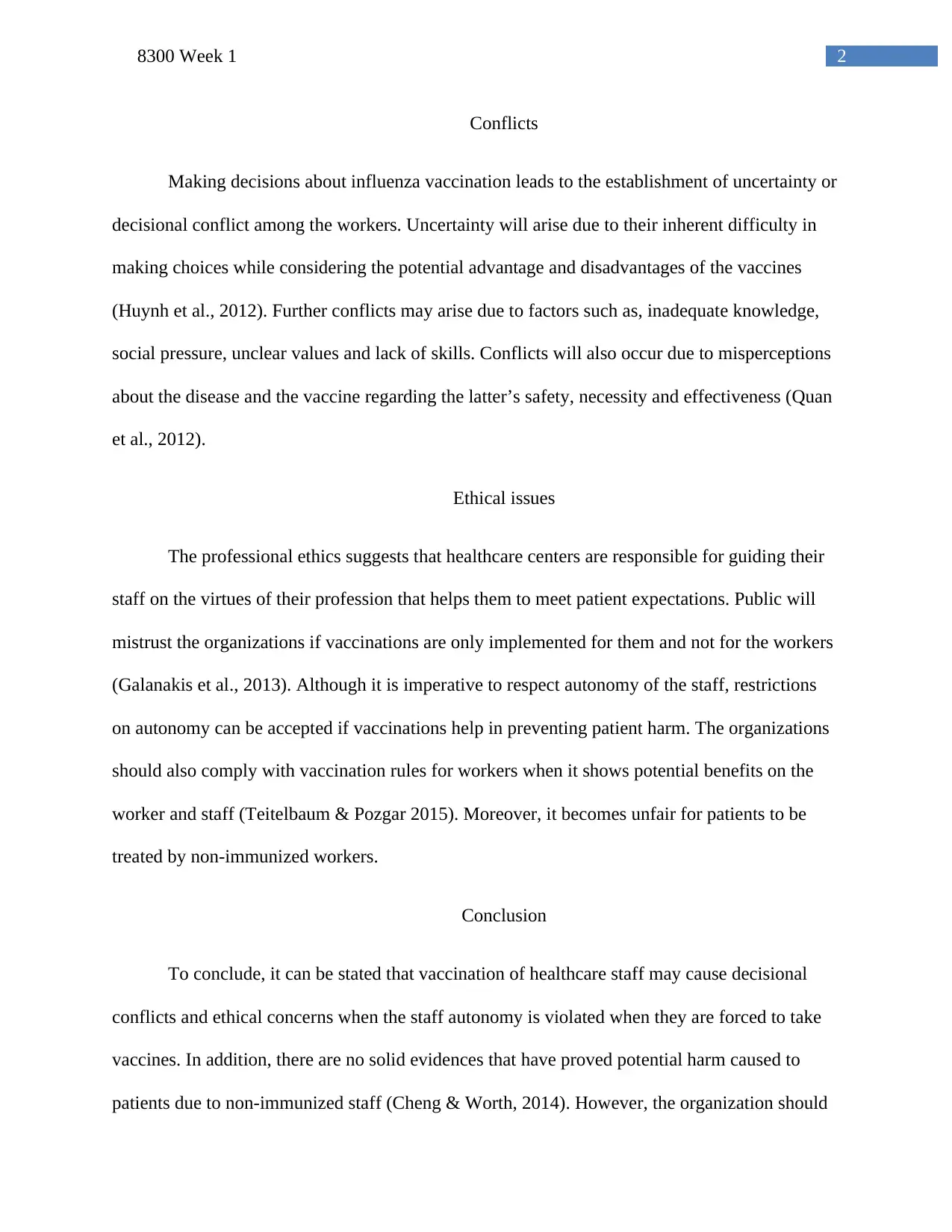
28300 Week 1
Conflicts
Making decisions about influenza vaccination leads to the establishment of uncertainty or
decisional conflict among the workers. Uncertainty will arise due to their inherent difficulty in
making choices while considering the potential advantage and disadvantages of the vaccines
(Huynh et al., 2012). Further conflicts may arise due to factors such as, inadequate knowledge,
social pressure, unclear values and lack of skills. Conflicts will also occur due to misperceptions
about the disease and the vaccine regarding the latter’s safety, necessity and effectiveness (Quan
et al., 2012).
Ethical issues
The professional ethics suggests that healthcare centers are responsible for guiding their
staff on the virtues of their profession that helps them to meet patient expectations. Public will
mistrust the organizations if vaccinations are only implemented for them and not for the workers
(Galanakis et al., 2013). Although it is imperative to respect autonomy of the staff, restrictions
on autonomy can be accepted if vaccinations help in preventing patient harm. The organizations
should also comply with vaccination rules for workers when it shows potential benefits on the
worker and staff (Teitelbaum & Pozgar 2015). Moreover, it becomes unfair for patients to be
treated by non-immunized workers.
Conclusion
To conclude, it can be stated that vaccination of healthcare staff may cause decisional
conflicts and ethical concerns when the staff autonomy is violated when they are forced to take
vaccines. In addition, there are no solid evidences that have proved potential harm caused to
patients due to non-immunized staff (Cheng & Worth, 2014). However, the organization should
Conflicts
Making decisions about influenza vaccination leads to the establishment of uncertainty or
decisional conflict among the workers. Uncertainty will arise due to their inherent difficulty in
making choices while considering the potential advantage and disadvantages of the vaccines
(Huynh et al., 2012). Further conflicts may arise due to factors such as, inadequate knowledge,
social pressure, unclear values and lack of skills. Conflicts will also occur due to misperceptions
about the disease and the vaccine regarding the latter’s safety, necessity and effectiveness (Quan
et al., 2012).
Ethical issues
The professional ethics suggests that healthcare centers are responsible for guiding their
staff on the virtues of their profession that helps them to meet patient expectations. Public will
mistrust the organizations if vaccinations are only implemented for them and not for the workers
(Galanakis et al., 2013). Although it is imperative to respect autonomy of the staff, restrictions
on autonomy can be accepted if vaccinations help in preventing patient harm. The organizations
should also comply with vaccination rules for workers when it shows potential benefits on the
worker and staff (Teitelbaum & Pozgar 2015). Moreover, it becomes unfair for patients to be
treated by non-immunized workers.
Conclusion
To conclude, it can be stated that vaccination of healthcare staff may cause decisional
conflicts and ethical concerns when the staff autonomy is violated when they are forced to take
vaccines. In addition, there are no solid evidences that have proved potential harm caused to
patients due to non-immunized staff (Cheng & Worth, 2014). However, the organization should
⊘ This is a preview!⊘
Do you want full access?
Subscribe today to unlock all pages.

Trusted by 1+ million students worldwide
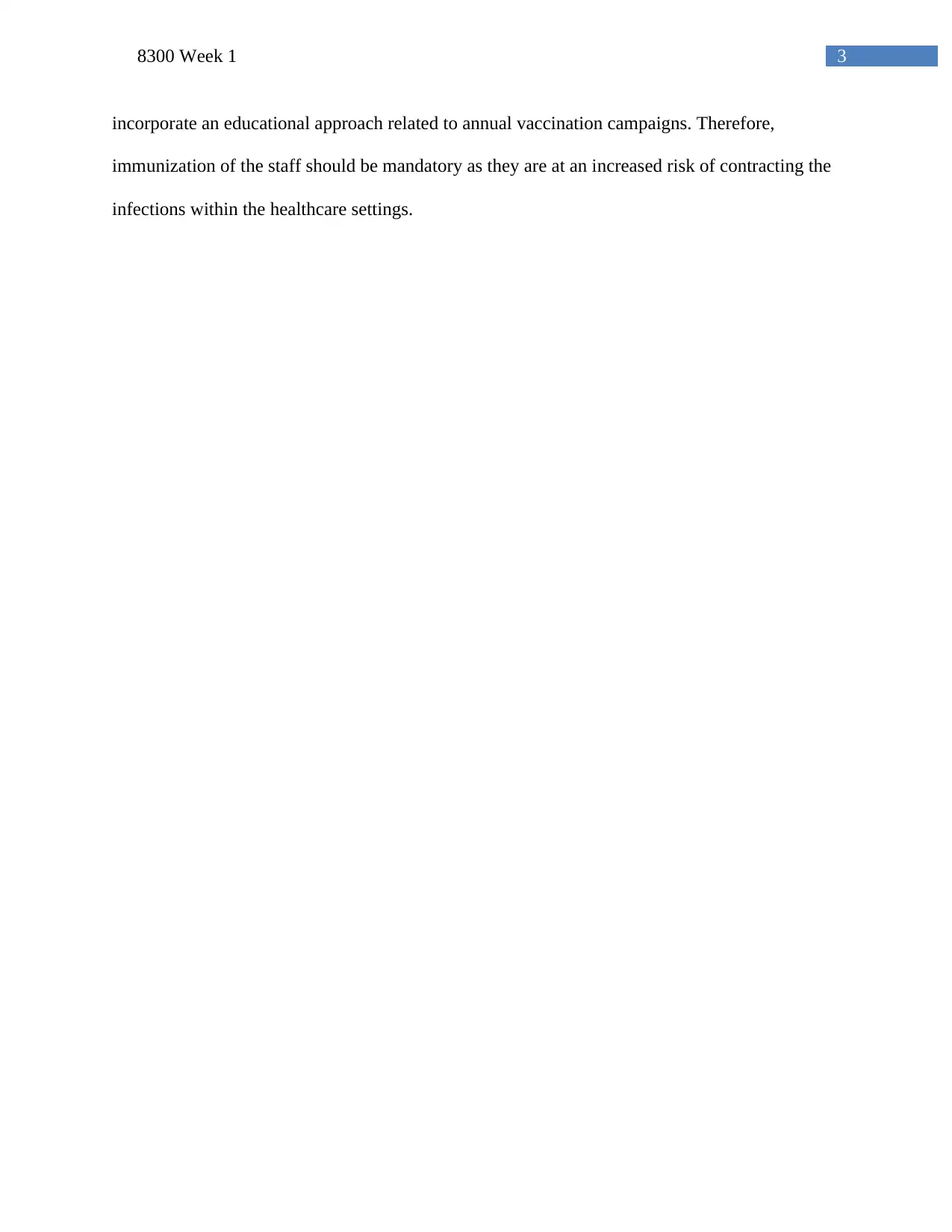
38300 Week 1
incorporate an educational approach related to annual vaccination campaigns. Therefore,
immunization of the staff should be mandatory as they are at an increased risk of contracting the
infections within the healthcare settings.
incorporate an educational approach related to annual vaccination campaigns. Therefore,
immunization of the staff should be mandatory as they are at an increased risk of contracting the
infections within the healthcare settings.
Paraphrase This Document
Need a fresh take? Get an instant paraphrase of this document with our AI Paraphraser
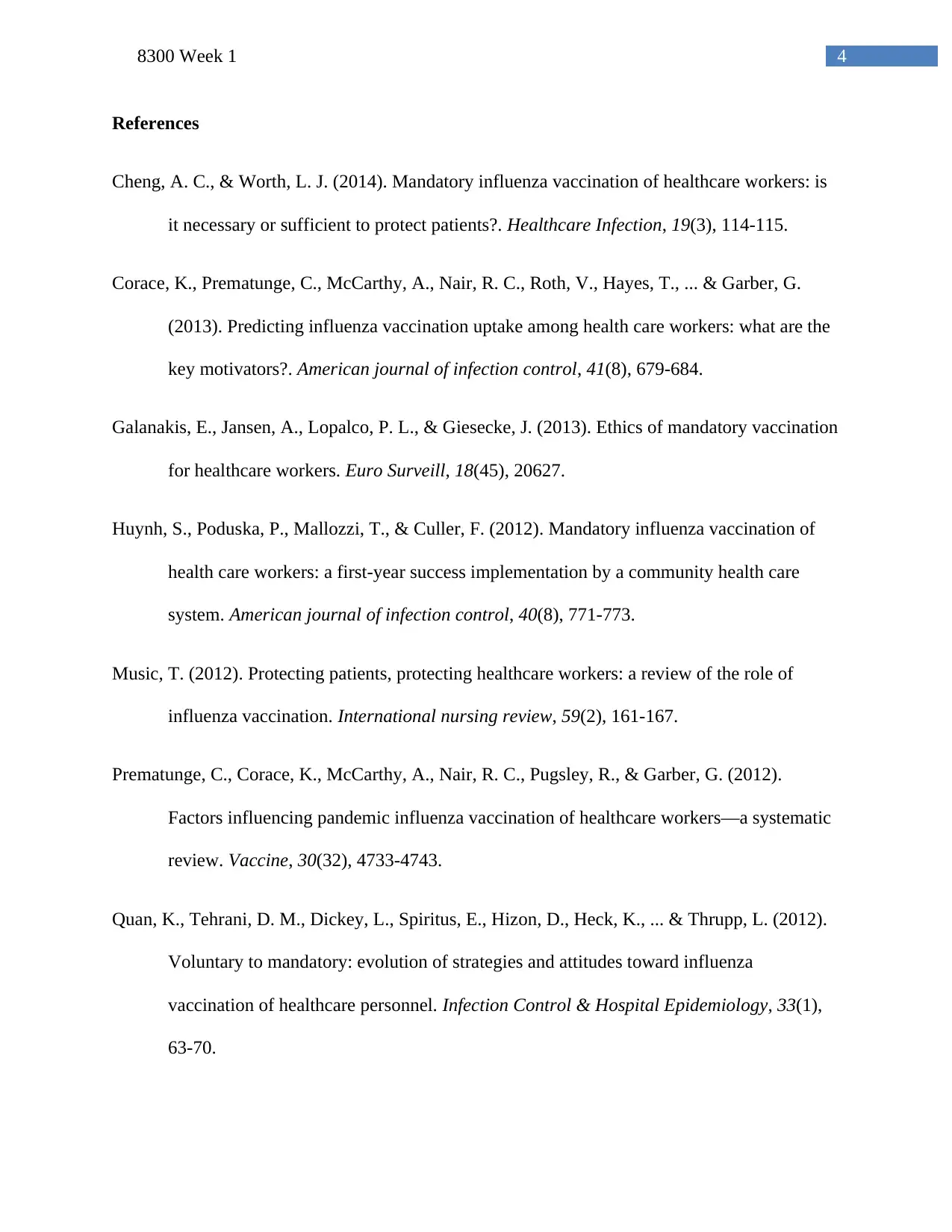
48300 Week 1
References
Cheng, A. C., & Worth, L. J. (2014). Mandatory influenza vaccination of healthcare workers: is
it necessary or sufficient to protect patients?. Healthcare Infection, 19(3), 114-115.
Corace, K., Prematunge, C., McCarthy, A., Nair, R. C., Roth, V., Hayes, T., ... & Garber, G.
(2013). Predicting influenza vaccination uptake among health care workers: what are the
key motivators?. American journal of infection control, 41(8), 679-684.
Galanakis, E., Jansen, A., Lopalco, P. L., & Giesecke, J. (2013). Ethics of mandatory vaccination
for healthcare workers. Euro Surveill, 18(45), 20627.
Huynh, S., Poduska, P., Mallozzi, T., & Culler, F. (2012). Mandatory influenza vaccination of
health care workers: a first-year success implementation by a community health care
system. American journal of infection control, 40(8), 771-773.
Music, T. (2012). Protecting patients, protecting healthcare workers: a review of the role of
influenza vaccination. International nursing review, 59(2), 161-167.
Prematunge, C., Corace, K., McCarthy, A., Nair, R. C., Pugsley, R., & Garber, G. (2012).
Factors influencing pandemic influenza vaccination of healthcare workers—a systematic
review. Vaccine, 30(32), 4733-4743.
Quan, K., Tehrani, D. M., Dickey, L., Spiritus, E., Hizon, D., Heck, K., ... & Thrupp, L. (2012).
Voluntary to mandatory: evolution of strategies and attitudes toward influenza
vaccination of healthcare personnel. Infection Control & Hospital Epidemiology, 33(1),
63-70.
References
Cheng, A. C., & Worth, L. J. (2014). Mandatory influenza vaccination of healthcare workers: is
it necessary or sufficient to protect patients?. Healthcare Infection, 19(3), 114-115.
Corace, K., Prematunge, C., McCarthy, A., Nair, R. C., Roth, V., Hayes, T., ... & Garber, G.
(2013). Predicting influenza vaccination uptake among health care workers: what are the
key motivators?. American journal of infection control, 41(8), 679-684.
Galanakis, E., Jansen, A., Lopalco, P. L., & Giesecke, J. (2013). Ethics of mandatory vaccination
for healthcare workers. Euro Surveill, 18(45), 20627.
Huynh, S., Poduska, P., Mallozzi, T., & Culler, F. (2012). Mandatory influenza vaccination of
health care workers: a first-year success implementation by a community health care
system. American journal of infection control, 40(8), 771-773.
Music, T. (2012). Protecting patients, protecting healthcare workers: a review of the role of
influenza vaccination. International nursing review, 59(2), 161-167.
Prematunge, C., Corace, K., McCarthy, A., Nair, R. C., Pugsley, R., & Garber, G. (2012).
Factors influencing pandemic influenza vaccination of healthcare workers—a systematic
review. Vaccine, 30(32), 4733-4743.
Quan, K., Tehrani, D. M., Dickey, L., Spiritus, E., Hizon, D., Heck, K., ... & Thrupp, L. (2012).
Voluntary to mandatory: evolution of strategies and attitudes toward influenza
vaccination of healthcare personnel. Infection Control & Hospital Epidemiology, 33(1),
63-70.
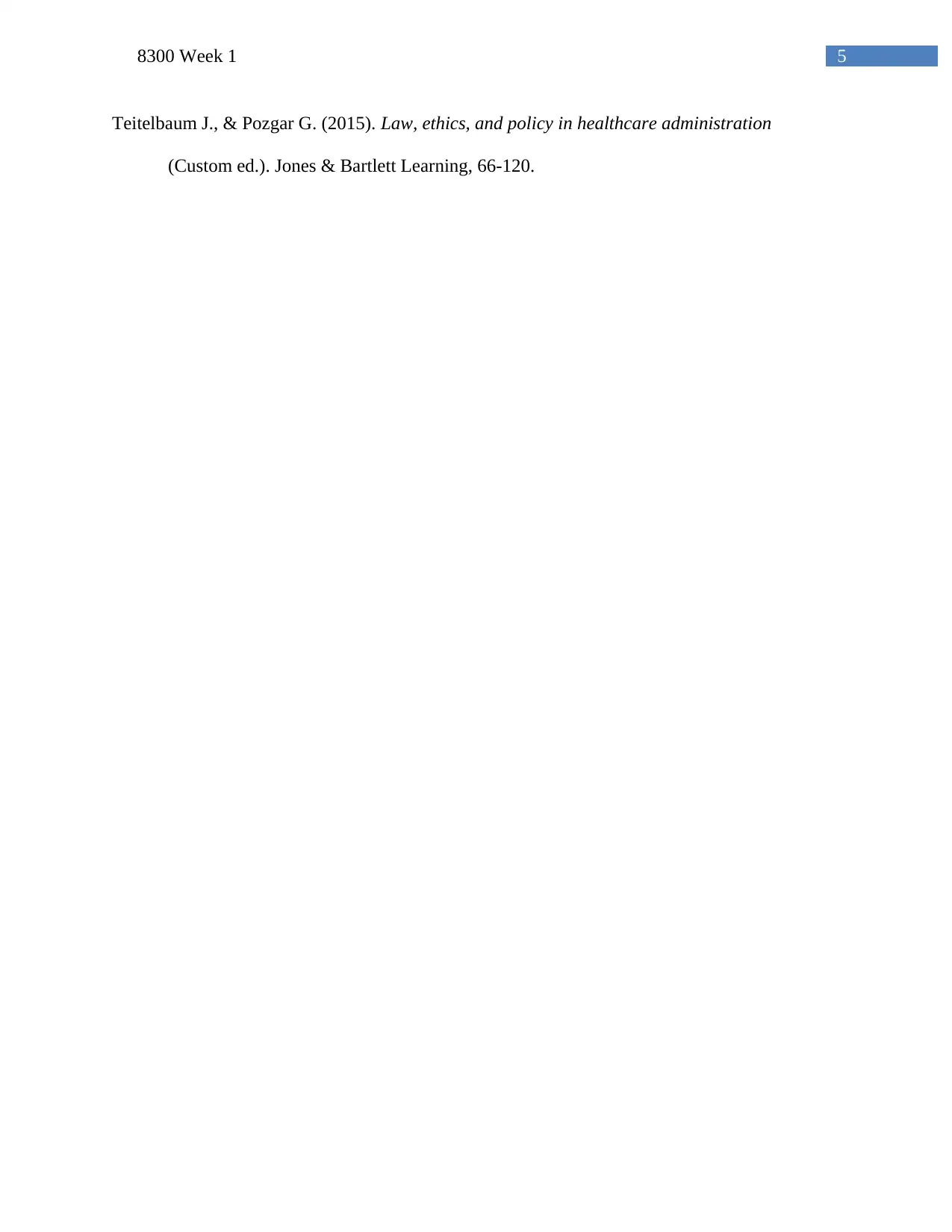
58300 Week 1
Teitelbaum J., & Pozgar G. (2015). Law, ethics, and policy in healthcare administration
(Custom ed.). Jones & Bartlett Learning, 66-120.
Teitelbaum J., & Pozgar G. (2015). Law, ethics, and policy in healthcare administration
(Custom ed.). Jones & Bartlett Learning, 66-120.
⊘ This is a preview!⊘
Do you want full access?
Subscribe today to unlock all pages.

Trusted by 1+ million students worldwide
1 out of 6
Related Documents
Your All-in-One AI-Powered Toolkit for Academic Success.
+13062052269
info@desklib.com
Available 24*7 on WhatsApp / Email
![[object Object]](/_next/static/media/star-bottom.7253800d.svg)
Unlock your academic potential
Copyright © 2020–2026 A2Z Services. All Rights Reserved. Developed and managed by ZUCOL.





